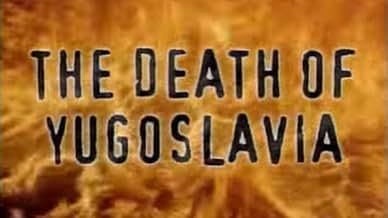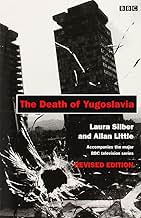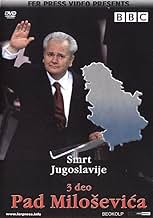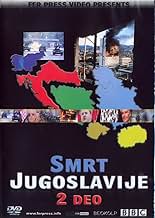The Death of Yugoslavia
- TV Mini Series
- 1995–1996
- 50m
IMDb RATING
8.6/10
1.4K
YOUR RATING
This documentary series covers the struggles of the Yugoslavian people during the collapse of their country, and the subsequent wars to finally find hope with the signing of the Final Peace ... Read allThis documentary series covers the struggles of the Yugoslavian people during the collapse of their country, and the subsequent wars to finally find hope with the signing of the Final Peace Accords.This documentary series covers the struggles of the Yugoslavian people during the collapse of their country, and the subsequent wars to finally find hope with the signing of the Final Peace Accords.
- Won 1 BAFTA Award
- 1 win & 1 nomination total
Browse episodes
Featured reviews
This documentary series (of five episodes) is a painstakingly compiled and researched account of the extended mass-bloodshed which marked the end of the old Federal Yugoslavia and spanned almost the entire first half of the 1990's. It includes a huge wealth of news footage and interviews with involved parties both "Yugoslav" and otherwise. The only real "improvement" which could be made to this amazing achievement would be the inclusion of later developments in the Balkans since the program was made. This was indeed done in the late 1990's for a repeat showing on BBC television, but the addition of some even more recent events would help to complete this admirably detailed and fulsome piece of work. Perhaps another whole episode might be warranted? The very succinct title of this documentary was made all the more appropriate by the eventual abandonment of the term "Yugoslavia" by the now-named Federal Republic of Serbia and Montenegro - a much belated and formal admission of that which occurred years before.
This program is required viewing for anyone who wishes to know about this horrible conflict, it's causes and it's many results.
This program is required viewing for anyone who wishes to know about this horrible conflict, it's causes and it's many results.
As I am very interested in the wars in the former Yugoslavia I watched this quite famous series and expected an unbiased series which would deliver a lot of facts. However in this regard the series is very disappointing as it does not deliver facts but instead speculations and assumptions are shown as undeniable facts.
The series consists mainly of interviews with the main leaders of the warring factions and the UN representatives. This is the best part about this series as it shows us the different opinions on the events that happened. In between this interviews a narrator tells the viewer what happened and here this series fails on many occasions as it quite often presents assumptions as facts or tells us about the intentions behind certain events but completely lacks evidence for this. The most obvious assumption is the alleged deal between Milosevic and Tudjman about the division of Bosnia. The series tells us that this deal was the main reason for the war in Bosnia. What it does not tell us is that there is no evidence for such a deal. Mesic and Karadzic are interviewed about this deal however they both were not present during the Milosevic/Tudjman meeting. Moreover the director of this series, probably to support his thesis shows us the meeting right before the war in Bosnia, however the meeting took place before the war in Croatia. Also Tudjman's comment about Bosnia was intensified by the not very exact translation. When he said that "another" option was the division of Bosnia, it was translated by the narrator as "the only option" was the division. I realized the same thing several times while watching this series, that certain statements were intensified by a slightly inaccurate translation (I watched the German version, maybe the others are more accurate).
On other occasions the series is very one sided and superficial, for instance when it tells that the Serbs were afraid of Croatia because the Croat Coat of arms (the red and white checkerboard) was used during WWII. The series does not loose a single word on the fact that the checkerboard was used for hundreds of years, even in Yugoslavia, which renders the narrator's thesis that the checkerboard was the equivalent to the swastika completely wrong (Actually the U was the equivalent to the swastika).
In the end this series is interesting because of the interviews and some interesting footage, which is the reason why i gave it 3 out of 10. I do not agree with the previous reviewer that the documentary is flawed because of this. There is no ultimate truth about Yugoslavia, so by interviewing people from each side you get as close as possible. Another way would be to deliver facts like documents or audio/video footage to support the comments by the narrator on certain events and here this series fails almost completely.
The series consists mainly of interviews with the main leaders of the warring factions and the UN representatives. This is the best part about this series as it shows us the different opinions on the events that happened. In between this interviews a narrator tells the viewer what happened and here this series fails on many occasions as it quite often presents assumptions as facts or tells us about the intentions behind certain events but completely lacks evidence for this. The most obvious assumption is the alleged deal between Milosevic and Tudjman about the division of Bosnia. The series tells us that this deal was the main reason for the war in Bosnia. What it does not tell us is that there is no evidence for such a deal. Mesic and Karadzic are interviewed about this deal however they both were not present during the Milosevic/Tudjman meeting. Moreover the director of this series, probably to support his thesis shows us the meeting right before the war in Bosnia, however the meeting took place before the war in Croatia. Also Tudjman's comment about Bosnia was intensified by the not very exact translation. When he said that "another" option was the division of Bosnia, it was translated by the narrator as "the only option" was the division. I realized the same thing several times while watching this series, that certain statements were intensified by a slightly inaccurate translation (I watched the German version, maybe the others are more accurate).
On other occasions the series is very one sided and superficial, for instance when it tells that the Serbs were afraid of Croatia because the Croat Coat of arms (the red and white checkerboard) was used during WWII. The series does not loose a single word on the fact that the checkerboard was used for hundreds of years, even in Yugoslavia, which renders the narrator's thesis that the checkerboard was the equivalent to the swastika completely wrong (Actually the U was the equivalent to the swastika).
In the end this series is interesting because of the interviews and some interesting footage, which is the reason why i gave it 3 out of 10. I do not agree with the previous reviewer that the documentary is flawed because of this. There is no ultimate truth about Yugoslavia, so by interviewing people from each side you get as close as possible. Another way would be to deliver facts like documents or audio/video footage to support the comments by the narrator on certain events and here this series fails almost completely.
Dear gentlemen,
I don't won't to waste my life by talking about politics, so my comment will be quite short and precise. The thing is that this movie is made by one side in the conflict. Which one? Of course, UK and USA. Therefor it cannot be objective in any way. In every country of Former Yugoslavia there is a opinion that there is at least 50 % of guilt for wars in Yugoslavia that could be blamed on foreign countries and their secret services, Germany and USA in particular. Also, Death and sufferings of civilians were used so many times in propaganda purposes by USA gov. The most flagrant use of media in those purposes is demonstrated in the movie that deals with making up the war in Albania ( I think that Al Pacino has a role of American president, but I'm not sure). Anyways, I am trying to be objective and pretty liberal, so, I am not putting myself in either side of the conflicts, although I come from Serbia. Nice greets to everyone!
I don't won't to waste my life by talking about politics, so my comment will be quite short and precise. The thing is that this movie is made by one side in the conflict. Which one? Of course, UK and USA. Therefor it cannot be objective in any way. In every country of Former Yugoslavia there is a opinion that there is at least 50 % of guilt for wars in Yugoslavia that could be blamed on foreign countries and their secret services, Germany and USA in particular. Also, Death and sufferings of civilians were used so many times in propaganda purposes by USA gov. The most flagrant use of media in those purposes is demonstrated in the movie that deals with making up the war in Albania ( I think that Al Pacino has a role of American president, but I'm not sure). Anyways, I am trying to be objective and pretty liberal, so, I am not putting myself in either side of the conflicts, although I come from Serbia. Nice greets to everyone!
Forgive my summary for being contradictory because it sums up what's wrong with this documentary series on the destruction of the Socialist Federation Of Yugoslavia . By trying to be bitingly ironic DEATH ends up contradicting itself
The format is to be blame . We see tedious talking head interviews from everybody like Slobodan Milosovic the leader of Serbia and Franjo Tudjman the leader of Croatia to leaders of the various paramilitary leaders organisations to UN soldiers to people who were kicked out their villages during the war . The irony comes in the form of Tudjman or Milisovic saying he had nothing to do with such and such an event then the interviewing cutting to a paramilitary leader saying " So the president said to me I want [ Rival ethnic group ] kicked out of the region and I will supply you with the men and guns to do it " and the interview cutting back to Milosovic or Tudjman bleating " So you see it was nothing to do with me . I was not responsible " . By trying to be ironic , if not out and out cynical , what are we audience to learn by all this ? Since the paramilitaries are very nasty people in the first place why should we entirely believe them ?
The format also makes tedious viewing . I tuned in to find out about the very human cost of war , of why socialist brothers turn against each other in an orgy of nationalism and what it was like for the combatants , mercenaries , UN personnel and innocent civilians on the front line but DEATH doesn't really concern itself with people , only politics with large chunks of running time dedicated to footage of political meetings and talking head interviews of people who attended them which leads to the detriment of other issues . The Muslim - Croat conflict of 1993 which killed thousands is relegated to a few seconds of the bridge over Mostar being shelled . I should also point out that interviewing the architects of the war in the former Yugoslavia means that we're hearing a subjective point of view , not an impartial objective one
So I'm afraid I've got to disagree with the other two reviewers ( one of whom may have got this confused with another documentary - The narrator is an English male not Christiane Amanpour ) in saying that despite - Or is it because ? - the leaders of the former Yugoslavia and international diplomats are interviewed this is a very flawed documentary series
The format is to be blame . We see tedious talking head interviews from everybody like Slobodan Milosovic the leader of Serbia and Franjo Tudjman the leader of Croatia to leaders of the various paramilitary leaders organisations to UN soldiers to people who were kicked out their villages during the war . The irony comes in the form of Tudjman or Milisovic saying he had nothing to do with such and such an event then the interviewing cutting to a paramilitary leader saying " So the president said to me I want [ Rival ethnic group ] kicked out of the region and I will supply you with the men and guns to do it " and the interview cutting back to Milosovic or Tudjman bleating " So you see it was nothing to do with me . I was not responsible " . By trying to be ironic , if not out and out cynical , what are we audience to learn by all this ? Since the paramilitaries are very nasty people in the first place why should we entirely believe them ?
The format also makes tedious viewing . I tuned in to find out about the very human cost of war , of why socialist brothers turn against each other in an orgy of nationalism and what it was like for the combatants , mercenaries , UN personnel and innocent civilians on the front line but DEATH doesn't really concern itself with people , only politics with large chunks of running time dedicated to footage of political meetings and talking head interviews of people who attended them which leads to the detriment of other issues . The Muslim - Croat conflict of 1993 which killed thousands is relegated to a few seconds of the bridge over Mostar being shelled . I should also point out that interviewing the architects of the war in the former Yugoslavia means that we're hearing a subjective point of view , not an impartial objective one
So I'm afraid I've got to disagree with the other two reviewers ( one of whom may have got this confused with another documentary - The narrator is an English male not Christiane Amanpour ) in saying that despite - Or is it because ? - the leaders of the former Yugoslavia and international diplomats are interviewed this is a very flawed documentary series
This is a great 5 part documentary narrated by Christiane Amanpour about the Origins and Results of the Balkan Wars of the 1990s. It starts out following Milosevic and his break with Communist Party policy by supporting Serb nationalists in Kosovo. Slovenia was the 1st republic to oppose him and broke off with a short relatively minor war in 1991. Then came Croatia with a rising nationalist mentality of its own led by Franjo Tudjman. This war was much fiercer as the town of Vukovar was annihilated. Then a secret deal was reached between Tudjman and Milosevic to divide Bosnia between themselves launching the genocidal war there in 1992.
All the leaders are interviewed including psychiatrist-war criminal Karadzic (no contradiction there--we know Nazi concentration camps were run by psychiatrists, and we know the destructive effects of the psychiatric industry on humankind). Also Mladic, the general handpicked by Milosevic to take over the genocide operation in Bosnia. Here we get all the main incidents, including the Belgrade debates and power struggles within the party, the Serb sniper at Sarajevo's Holiday Inn, and finally an in-depth look at what happened at Srebrenica. The UN went in there and made it a "safe zone" only to abandon it to Mladic and his mass killers. And as we speak Mladic and Karadzic are safe and comfy in Republika Srbska. --Update: the two are now in the Hague awaiting sentencing for genocide.
Also importantly Bush the Elder is shown with James Baker after his own wars in Iraq and Panama, saying they have no interest in Bosnia, since they didn't care about saving lives; only taking them. And then Clinton came and didn't do much either until the war was winding down in 1995.
All the leaders are interviewed including psychiatrist-war criminal Karadzic (no contradiction there--we know Nazi concentration camps were run by psychiatrists, and we know the destructive effects of the psychiatric industry on humankind). Also Mladic, the general handpicked by Milosevic to take over the genocide operation in Bosnia. Here we get all the main incidents, including the Belgrade debates and power struggles within the party, the Serb sniper at Sarajevo's Holiday Inn, and finally an in-depth look at what happened at Srebrenica. The UN went in there and made it a "safe zone" only to abandon it to Mladic and his mass killers. And as we speak Mladic and Karadzic are safe and comfy in Republika Srbska. --Update: the two are now in the Hague awaiting sentencing for genocide.
Also importantly Bush the Elder is shown with James Baker after his own wars in Iraq and Panama, saying they have no interest in Bosnia, since they didn't care about saving lives; only taking them. And then Clinton came and didn't do much either until the war was winding down in 1995.
Did you know
- TriviaInterviews from the series have been used by the International Criminal Tribunal for the former Yugoslavia in war crimes prosecutions.
- ConnectionsFeatured in Barend en Van Dorp: Episode dated 14 May 1999 (1999)
- How many seasons does The Death of Yugoslavia have?Powered by Alexa
Details
- Release date
- Country of origin
- Language
- Also known as
- Smrt Jugoslavije
- Production company
- See more company credits at IMDbPro
- Runtime
- 50m
- Color
- Aspect ratio
- 4:3
Contribute to this page
Suggest an edit or add missing content























